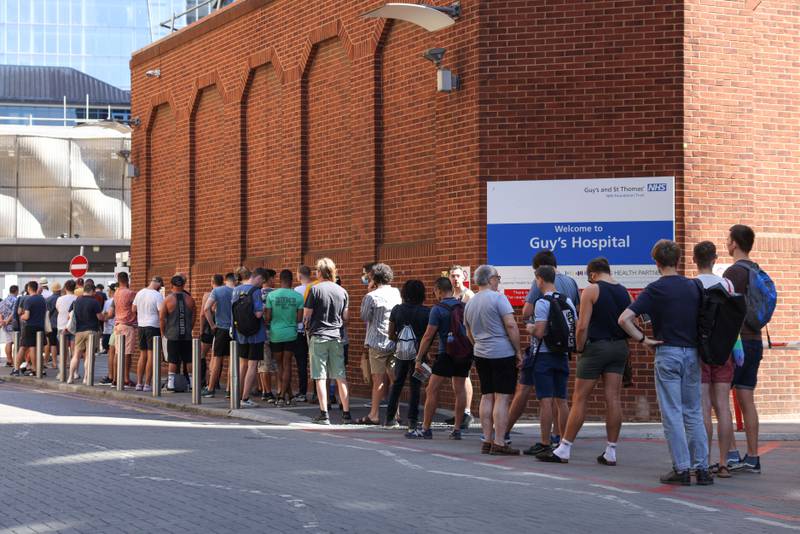Monkeypox outbreak may be peaking, UK says

British health authorities said on Friday that the monkeypox outbreak in the country may be peaking and that the epidemic’s growth rate has slowed. The UK’s Health Security Agency said in a statement that there were “early signs that the outbreak is plateauing”, with 2,859 cases detected since May. No deaths have been reported.
Last month, authorities estimated the outbreak was doubling in size about every two weeks, but the number of new infections has dropped in recent weeks. “While the most recent data suggest the growth of the outbreak has slowed, we cannot be complacent,” said Meera Chand, director of clinical and emerging infections at the agency.Read More : WHO Europe expects more monkeypox-related deaths She said anyone who thought they might have monkeypox should skip meeting friends and social situations. The agency said its most recent analysis of the outbreak “shows that monkeypox continues to be transmitted primarily in interconnected sexual networks of gay, bisexual or men who have sex with other men".
More than 70 per cent of the UK's cases have been reported in London - 99 per cent of them among men. British officials noted a small number of infections among women, but said there was not enough evidence to suggest there was a sustained spread of monkeypox.
Scientists who analysed monkeypox viruses in the UK noted a number of mutations compared to viruses circulating in Africa, but said there was no evidence those genetic changes made monkeypox any more transmissible. Experts suspect the monkeypox outbreaks in North America and Europe may have originated in Africa long before the disease started spreading in Spain and Belgium.
To date, more than 26,000 monkeypox cases have been reported in about 90 countries, with a 19 per cent increase in the past week. Last month, the UK downgraded its assessment of the monkeypox outbreak and dropped a recommendation for the contacts of monkeypox cases to isolate for three weeks unless they have symptoms.
The change was prompted by data showing that only a small number of contacts are ultimately sickened by monkeypox and a lack of evidence that the disease spreads without close, intimate contact. On Thursday, the US declared its outbreak of monkeypox to be a national emergency, with the World Health Organisation designating it a global emergency last month.
Monkeypox spreads when people have close, physical contact with an infected person’s lesions, their clothing or bedsheets. Most people recover without needing treatment, but the lesions can be extremely painful and more severe cases can result in complications including encephalitis and death.
Last month, authorities estimated the outbreak was doubling in size about every two weeks, but the number of new infections has dropped in recent weeks. “While the most recent data suggest the growth of the outbreak has slowed, we cannot be complacent,” said Meera Chand, director of clinical and emerging infections at the agency.
More than 70 per cent of the UK's cases have been reported in London - 99 per cent of them among men. British officials noted a small number of infections among women, but said there was not enough evidence to suggest there was a sustained spread of monkeypox.
Scientists who analysed monkeypox viruses in the UK noted a number of mutations compared to viruses circulating in Africa, but said there was no evidence those genetic changes made monkeypox any more transmissible. Experts suspect the monkeypox outbreaks in North America and Europe may have originated in Africa long before the disease started spreading in Spain and Belgium.
To date, more than 26,000 monkeypox cases have been reported in about 90 countries, with a 19 per cent increase in the past week. Last month, the UK downgraded its assessment of the monkeypox outbreak and dropped a recommendation for the contacts of monkeypox cases to isolate for three weeks unless they have symptoms.
The change was prompted by data showing that only a small number of contacts are ultimately sickened by monkeypox and a lack of evidence that the disease spreads without close, intimate contact. On Thursday, the US declared its outbreak of monkeypox to be a national emergency, with the World Health Organisation designating it a global emergency last month.
Monkeypox spreads when people have close, physical contact with an infected person’s lesions, their clothing or bedsheets. Most people recover without needing treatment, but the lesions can be extremely painful and more severe cases can result in complications including encephalitis and death.
Source: www.thenationalnews.com
